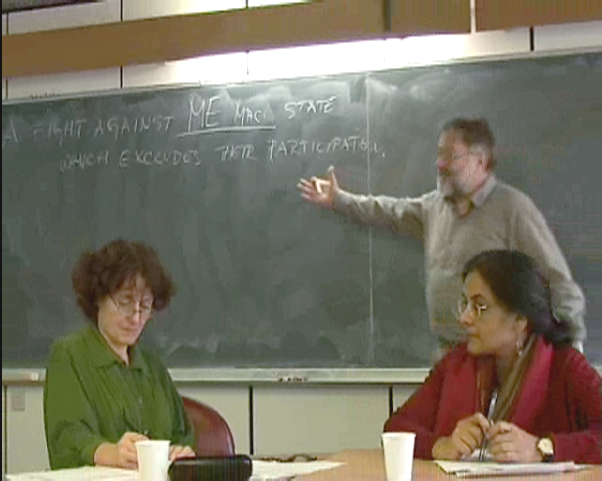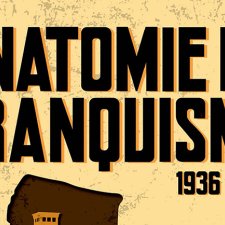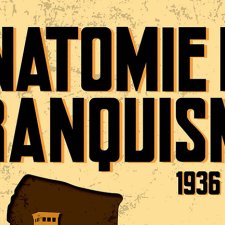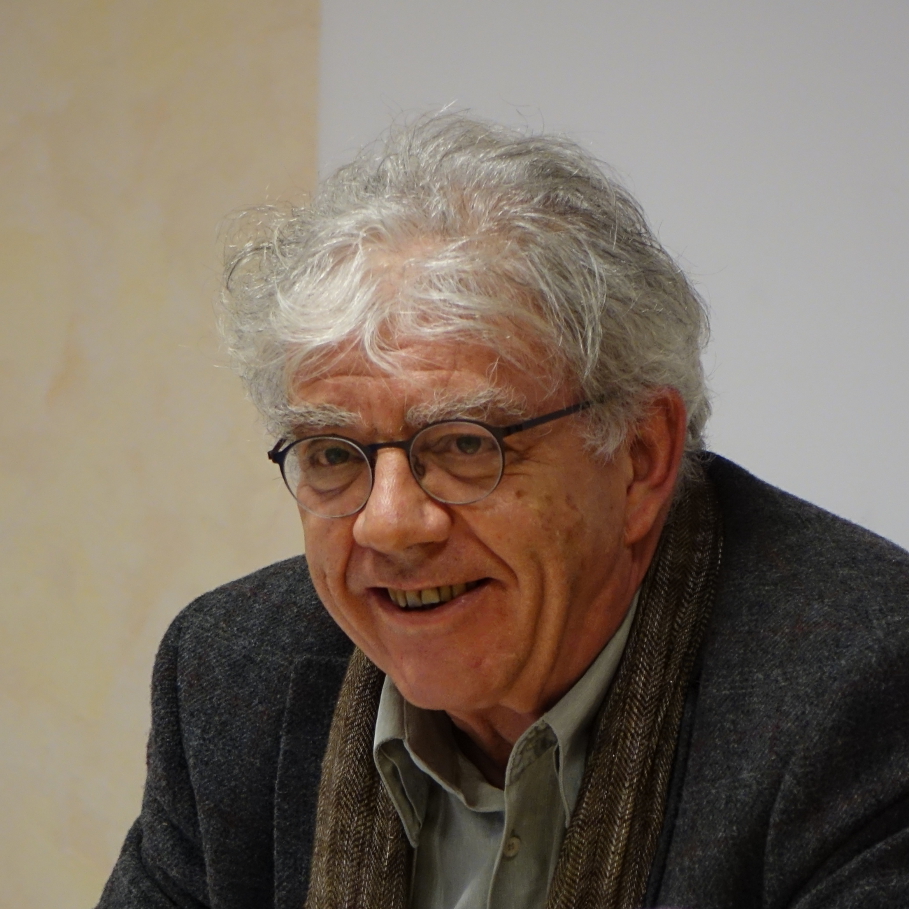Chapitres
- Intellectual Background06'57"
- Revolutionary Fights14'02"
- Imprisonment07'46"
- End of Political Activities07'30"
- First Publications04'15"
- Borders, Boundaries and National Identity05'42"
- Academic and Institutional Activities05'12"
- Relationship with the MSH01'55"
- the issue of India’s Partition04'29"
- Politics of Dialogue03'42"
- Universalist Position11'00"
Notice
Space, Nationalism and Power
- document 1 document 2 document 3
- niveau 1 niveau 2 niveau 3
Descriptif
Ranabir SAMADDAR is a founder of the MCRG - Mahanirban Calcutta Research Group, India- and its journal, Refugee Watch. He was earlier a professor of South Asia Studies, and subsequently the founder-Director of the Peace Studies Programme at the South Asia Forum for Human Rights, Kathmandu. Known for his critical studies on contemporary issues of justice, human rights, and popular democracy in the context of post-colonial nationalism, trans-border migration, community history, and technological restructuring in South Asia, he has served on various commissions and study groups on issues such as partitions, critical dictionary on globalisation, patterns of forced displacement and the institutional practices of refugee care and protection in India, rights of the minorities and forms of autonomy, technological modernization, and occupational health and safety. His recently published study of dialogues as part of war and peace politics, titled "The Politics of Dialogue" (Ashgate, 2004) is a product of his four-year research on war and peace in South Asia.
Intervention / Responsable scientifique
Thème
Documentation
Bibliographie,Curriculum Vitæ
Select Publications (English)
Books
-
Co-authored with Stefano Bianchini, Sanjay Chaturvedi, and Rada Ivekovic) Partitions - Reshaping States and Minds (London and New York: Frank Cass, 2005).
-
Politics of Dialogue - Living Under the Geopolitical Histories of War and Peace (Aldershot, UK: Ashgate, 2004).
-
In the Time of Nationalism - Political Essays on Bangladesh (Dhaka: University Press Limited, 2002).
-
A Biography of the Indian Nation, 1947-1997 (New Delhi: Sage Publications, 2001).
-
Marginal Nation - Trans-border Migration from Bangladesh to India (New Delhi: Sage Publications, 1999).
-
Memory, Power, Identity - Politics in Jungle Mahals, Bengal 1890-1950 (Hyderabad: Orient Longman, 1997).
-
Whose Asia Is It Anyway - Region and the Nation in South Asia (Calcutta: Maulana Abul Kalam Azad Institute of Asian Studies and Pearl Publishers, 1996).
-
Workers and Automation - the Impact of New Technology on the Newspaper Industry (New Delhi: Sage Publications, 1994).
Edited Volumes
-
South Asian Peace Studies I - An Introduction to Concept, Scope and Themes (New Delhi: Sage Publications, 2004).
-
Refugees and the State - Practices of Asylum and Care in India, 1947-2000 (New Delhi: Sage Publications, 2003).
-
Space, Territory and the State - New Readings in International Politics (Hyderabad: Orient Longman, 2002).
-
(With Helmut Reifeld) Peace as Process - Reconciliation and Conflict Resolution in South Asia (Delhi: Manohar Publishers, 2001).
-
Reflections on Partition in the East (New Delhi and Calcutta: Vikas Publishing House and Calcutta Research Group, 1997).
-
Women in Asia - Work, Culture and Politics in South and Central Asia (Calcutta and New Delhi: Maulana Abul Kalam Azad Institute of Asian Studies and Vikas Publishing House, 1997).
-
(With Barun De) State, Development and Political Culture - Bangladesh and India (Calcutta and New Delhi: Maulana Abul Kalam Azad Institute of Asian Studies and Har Anand, 1997).
-
Anya Pakistan (a collection of political and literary writings of Pakistan, in Bengali; Calcutta: Punascha and Calcutta Research Group, 1996).
-
Cannons Into Ploughshares - Militarization and Prospects of Peace in South Asia (New Delhi: Lancers Publishers, 1995).
-
(Amiya Bagchi in collaboration with Ranabir Samaddar) New Technology, Labour Market and Labour Response (New Delhi: Sage Publications, 1994).
Published Papers
-
"The Futures of the Colonised", Futures, 36, 2004.
-
"Deaths, Responsibility, and Justice", in English in "Three Essays on Law, Rights, and Justice" (Kathmandu), 2003 and in French and Arabic, Naqd, (Algiers), 2004.
-
"Five Hypotheses on War and Humanitarianism", The Journal of Social Studies, 100, April-June 2003 (also published in Seminar annual number 2003, and in French on http://www.mondialisation.org/), also as "Power and Rights - in Life and Death", www.sacw.net/2002/samaddar062003.html
-
"Chronicles of a No-Where People Along the Indo-Bangladesh Border" (co-authored), SAFHR Paper 15, Kathmandu, 2003.
-
"Protecting the Victims of Forced Migration - Mixed Flows and Massive Flows" in Monique Mekenkamp, Paul van Tongeren, and Hans van de Veen (eds.), Searching for Peace in Central and South Asia (Boulder, Colorado: Lynne Rienner Publishers, 2002).
-
"Colonial Constitutionalism", Identity, Culture and Politics, 3 (1), July 2002.
-
"Three Essays on Law, Rights, and Justice", SAFHR Paper 11, Kathmandu, 1992, also on http://www.safhr.org/
-
"Murders in Sky and on the Ground", http://www.russfound.org/Launch/samaddar.htm
-
"The Destiny of a Translated Constitutional Culture", Transeuropeennes, 22, Spring-Summer 2002 (translated in French also), and as "Colonial Constitutionalism", www.codesria.org/Links/Publications/icp/july_2002.htm
-
"A History of Care and Power", review essay in The Economic and Political Weekly, 37 (25), June 2002.
-
"South Asia - Self-Determination and the Democratic Argument" in Girin Phukon (ed.), Ethnicity and Polity in South Asia" (Delhi: South Asian Publishers, 2002).
-
"Crime and Punishment in Genoa", Himal, the South Asian Magazine, August 2001; also on, www.himalmag.com/august2001
-
"Absence de lois - Globalisation de lois' (translated in French by Francesca Gee and François de Bernard), Ref: 000000823, French online annotated dictionary on globalization, subsequently republished in Liberation, April 2001.
-
(With Shahid Fiaz), "Peace Process in Sri Lanka - An Audit Report", SAFHR Paper 8, Kathmandu, 2001.
-
"The Last Hurrah that Continues", Transeuropeennes, 19-20, 2001 (translated in French also); subsequently published as a chapter in Ghislaine Glasson Deschaumes and Rada Ivekovic (eds.), Divided Countries, Separated Cities - The Modern Legacy of Partition (New Delhi: Oxford University Press, 2003).
-
"Friends, Foes and Understanding", The Economic and Political Weekly, 36 (10), March 2001.
-
"The Strange Case of Lines that Got Mixed Up", Security Dialogue, 32 (1), March 2001.
-
"Tales of War, Tales of Peace - Continuing War through Peace Process", La Mazarine, February 2001.
-
"Leaders and Publics - Stories in the Time of Transition", Indian Economic and Social History Review, 37 (4), October-December 2000.
-
"Governing through Peace Accords", Hagar - International Social Science Review, 1 (2), 2000; also as "Governing Through Peace Accords: A democratic Inquiry", www.bg.ac.il/humphrey/seminar/
-
"Reforms, Democracy and Justice - Some Issues of State and Market in South Asia" in Helmut Reifeld et.al (eds.) Pluralism and Equality - Values in Indian Society and Politics (Delhi: Sage, 2000).
-
"Autonomy, Self-determination and the Requirements of Minimal Justice in South Asia" in Heikki Patomaki (ed.), Politics of Civil Society - A Global Perspective on Democratisation (Nottingham and Helsinki: Network Institute for Global Democratisation in Nottingham Trent University and Finnish Institute of International Affairs, 2000); also as "Requirements of Minimal Justice in South Asia", www.greekhelsinki.gr/bhr/english/special_issues/CEDIME-unwgm2001/G0112127.doc
-
"Inside/Outside" in Pradip Kumar Bose, Refugees in West Bengal - Institutional Practices and Contested Identities (Calcutta: Calcutta Research Group, 2000); reprinted in Omprakash Mishra (ed.), Forced Migration in the South Asian Region - Displacement, Human Rights and Conflict Resolution (Delhi: Manak Publications, 2004).
-
"Legacies and the Nation - Maulana Maniruzzaman Islamabadi and Maulana Akram Khan" in Perween Hasan and Mufakharul Islam (ed.), Essays in Memory of Momtazur Rehman Tarafdar (Dhaka: Centre for Advance Research in Humanities, University of Dhaka, 1999).
-
(Co-authored) "Indo-Bangladesh Cross-border Migration and Trade", Economic and Political Weekly, September 1999.
-
"Those Accords - A Bunch of Documents", SAFHR Paper Series 4, Kathmandu, 1999.
-
"India's Minorities after Fifty Years of Partition and Independence" in Sumanta Banerjee (ed.), Shrinking Space - Minority Rights in South Asia (Kathamndu & Delhi: SAFHR and Manohar Publications, 1999).
-
"The Long and Short of Peace", Calcutta Journal of Political Studies, Special number of the Department of Political Science of the University of Calcutta, 1999.
-
"Germany unto France - A Matter of How Nations Meet", Special issue on Fifty Years of Germany of Liberal Times, 7 (2), 1999.
-
"Forced Population Movements in South Asia - The Humanitarian Question" in Tapan K. Bose and Rita Manchanda (eds.), States, Citizens and Outsiders (Kathmandu and Delhi: South Asia Forum for Human Rights and Manohar, 1998).
-
"The Failed Dialectic of Territoriality and Security, and the Imperatives of Dialogue", International Studies, 35(1), 1998.
-
"Ethnicity, Fragmented Politics and Labour Market in South Asia - Issues in Transborder Migration" in Arun Kumar Banerjee (ed.), Secutiry Issues in South Asia - Domestic and External Sources of Threats to Security (Calcutta: Minerva, 1998).
-
"Nation Building -- Interpretations of the Bangladesh War," India International Qurterly, 24 (2 & 3), Monsoon 1997, reprinted in Geeti Sen (ed.) Crossing Boundaries - Culture and Identity (Hyderabad: Orient Longman, 1997).
-
"Flowing Waters and the Nationalist Metaphors", Studies in Conflict and Terrorism, 20 (2), April-June 1997.
-
"The History that Partition Creates" in Reflections on Partition in the East, 1997, cited above.
-
"Still They Come - Migrants in Post Partition Bengal" in Reflections on Partition in the East, 1997, cited above.
-
"Waiting for the Historian: Issues in the Historiography of 1971 in Bangladesh", Azad Institute Working Paper 5, 1997.
-
"Elementary Aspects of Nationalism in Bangladesh" in S.R. Chakraborty (ed.), Bangladesh - Society, Politics and Economy (Delhi: Har Anand Pub., 1997).
-
"Knowing the Worker - The Tannery Majdur of Tangra" (with Debjani Datta) in Parthasarathi Banerjee and Yoshihiro Sato (eds.) Skill and Technological Change - Society and International Perspective (New Delhi: Har Anand, 1997).
-
"Sources or Texts? The Issue of Intertextuality in Understanding Jamboni" in Chittabrata Palit (ed.), Political Economy and Protest in Colonial India" (Calcutta: Firma KLM, 1997).
-
"Marginal Nation and the Reasons of State" in Nauman Naqvi (ed.), Rethinking Security, Rethinking Development (Islamabad: Sustainable Development Policy Institute, 1996).
-
"Bengal Women in Politics - An Argument Against Essentialisms of Home and The World", Journal of the Asiatic Society of Bangladesh, 41 (2), December, 1996).
-
"Disciplining Historical Memory of a People" in Partha Chatterjee (ed.), Texts of Power - Emergence of Disciplines in Bengal (Minnesota, 1995 and Calcutta: Stree Pub, 1996).
-
"Migrants, Refugees and Human Rights in South Asia", in Jurgen Axer (ed.), The Human Rights Community and Conflict Resolution in South Asia - The Applicability of European Examples (Proceedings of the Strasbourg Conference, European Commission of Human Rights, Council of Europe, Strasbourg and Friedrich Naumann Stiftung, Brussels), 1996.
-
"Preparing for a Peace Studies Syllabus in South Asia", UNESCO International Textbook Research Network Newsletter 5, George Eckert Institute,Germany, 1996.
-
"Distant Guns and Enchanted Minds" in Cannons into Ploughshares - Militarization and Prospects of Peace in South Asia, cited above, 1995.
-
"Towards the National Agenda of a Bengali Muslim Literature", Theoretical Perspectives, 1 (2), 1995.
-
"Many Histories and Few Silences - The Nationalist History of Nationalism in Bangladesh" in State, Development and Political Culture, 1997, cited above and first published as Azad Institute Working Paper 1, 1995.
Select Publications (in Bengali)
Monographs
-
Bharatiyo Rajnitir Samajik Bhitti (in Bengali - Social Bases of Indian Politics; Calcutta: University of Calcutta, 1986).
-
Bharater Jatiyo Andolan O Jatiyo Sanghatir Samashya (in Bengali - Indian National Movement and Problems of National Integration; Calcutta: West Bengal Book Board, 1985).
Papers
-
"Ajker Sylhet Ebong Ek Bismritaprai Kabi" (An Almost Forgotten Poet and Today's Sylhet), Chaturanga, 57 (2), 1997.
-
"Pakistan Bharat Samparka" (Pakistan India Relations Today), Baromas, Summer, 1997.
Ph.D. (Political Science), Calcutta University
Ph.D. dissertation title, "Economics, Politics and The Age of Electronics - A Case Study of Automation in the Indian Newspaper Industry"
M.A. (Political Science), Calcutta University
B.A. (hons. in Political Science), Calcutta University
Presently Serving
Director, Calcutta Research Group, Calcutta, FE 390, Salt Lake City, Kolkata 700106, India
Previous Posts Held
1999-2003 : Director, Peace Studies Programme, South Asia Forum for Human Rights, Kathmandu
1997-1999 : Professor (Professor-in-charge on 1997-98), Maulana Abul Kalam Azad Institute of Asian Studies, Calcutta
1993-1997 : Senior Fellow, Maulana Abul Kalam Azad Institute of Asian Studies
1989-1992 : Fellow, Political Science, Centre for Studies in Social Sciences, Calcutta
1991-1996 : Part Time Lecturer, the Department of Political Science, Rabindra Bharati University
1980-1989 and 1992 : Reader and previously Senior Lecturer and Lecturer, Department of Political Science, Gobardanga Hindu College, 24 Parganas (North), West Bengal
Research Areas
Migration and Refugee Studies
Peace Studies with an emphasis on the theory and practices of dialogue
Nationalism and post-colonial statehood in South Asia
Labour Studies with reference to technological restructuring, and labour flows across borders.
Work & Research Related Experience
I. Since 2004 :Scientific coordinator of a seminar programme (hosted by the Maison Des Sciences de L'homme, Paris) on comparative studies on constitutionalism and change
II. Since 2003 : Designed and directed winter course on forced migration in South Asia
III. 1999-2003 : Designed and directed regional peace studies programme which included designing public audits of peace, developing audit methodology, and holding South Asian peace studies orientation courses at regional level and national level
IV. Since 2003 : Head of a 2 year research programme on patterns of autonomy in India
V. Since 2002 :Currently working on areas of law and justice, particularly constitutional origins of some of the political injustices in South Asia
VI. Since 1999 : Just completed work on the political dynamics of dialogue in the time of war and peace in South Asia that includes studies of (I) pluralities and partition, (II) geopolitics and democracy, (III) plural dialogues, (IV) politics of accommodation, (V) minority rights and forms of autonomy, (VI) politics of ceasefires, (VII) refugees and the politics of care, hospitality, and kindness, and (VIII) received histories of war and peace
VII. Since 1997 : Co-Founder of Calcutta Research Group, a public policy group on issues of human rights and peace in India and South Asia, with emphasis on the Northeast
VIII. Since 2002 : Member of an advisory group of the Social Science Research Council (SSRC) on fellowship programme for South Asia on "Politics of Resources"
IX. Since 2001 : Adviser of a working group set up by the Brookings Institution to study patters of internal displacement in South Asia in the light of the UN Guiding Principles (commonly known as Deng Principles) on Internal Displacement
X. Since 2001 : Head of a UNHCR research group on institutional practices of refugee care and protection in India
XI. 2001-2002 : As a Visiting Professor under International PROGRAMME of Advanced Studies of the Columbia University and the Maison Des Sciences De L'Homme, and supported by the University of Bologna, and University of Paris VIII, participated in a research group on a comparative study of partitions and dialogues
XII. 2001-2002 : Participated in a working group set up by the International Centre for Ethnic Studies (ICES) to conduct a diagnostic study of the institutional arrangements for protection of minority rights in countries of South Asia, and member of the planning team for advisory services on minority rights in South Asia
XIII. 2001 : Participated in a study conducted by the European Centre for Conflict Prevention (ECCP) on patterns of conflict and new approaches to peacemaking in South Asia
XIV. 2001 : Member of a UN sub-commission Minorities expert group in 2001 on forms of autonomy
XV. 2001 : Invitee to the Eminent Persons Group (UNHCR), South Asia
XVI. Since 1999 : Head of a working group of peace researchers on the concept and rules of peace audit exercise that involves determining methods of such audit of peace processes, their applicability, and summary of audits of three audit exercises in South Asia
XVII. 2000 : Participated in the working group of the International Peace Research Association (IPRA) on the study of dialogues
XVIII. 1996-2000 : Participated in the framing of modalities of dialogues on conflict resolution in various instances; meeting organised by the Council of Europe on human rights and conflict resolution in a comparative format involving Europe and Asia, particularly South Asia; member of a South Asian study team on the treatment of immigrants in Germany, particularly the Turks; member of the drafting committee of the South Asian Forum of Human Rights on the issues of the minorities and the refugees; member of the committee to discuss the model national law on the refugees in South Asia; chaired several panels both in India and abroad on peace studies and conflict-resolution projects; member of the inter-regional groups convened by the Council of Europe to study the regional human rights protection systems in Europe, Africa, and Asia
XIX. 1983-1987 : Member of the enquiry committee for wage revision in the graphics industry following technological modernisation
XX. 1989-1992 : Member of the citizens' enquiry committee regarding conditions of occupational health and safety of labour in the tanneries of Calcutta, and the health rights of the workers
XXI. 1992-1993 : Member of a workers' enquiry committee regarding the impact of technological modernisation on labour in the Eastern Railways
XXII. 1995-1999 : Course director of the South Asian Peace Studies Programme; coordinator of the planning group for orientation programme for M. Phil and Ph. D students on Critical Asian Studies; Member of the planning group of the School of International Studies, Jawaharlal Nehru University, for peace studies and publications programme therein
XXIII. 1995-1998 : Worked on patterns of forced migration in South Asia, particularly in the eastern part of the sub-continent
XXIV. 1995-1999 : Worked on post-colonial borders of the States of the region
XXV. 1993-2000 : Researched on nationalism in Bangladesh
XXVI. 1994-1998 : Edited monographs and working papers of the Maulana Abul Kalam Azad Institute of Asian Studies
XXVII. Since 1984 : Member of Institute of Historical Studies, Calcutta; member of West Bengal Political Science Association
XXVIII. 2000-2001 : Participated in the preparation of a dictionary on globalisation published from Paris, and member of an online group on globalisation - www.mondialisation.org
XXIX. Participated in the working group meetings of the UN on minority rights, philosophy of reconciliation
XXX. Participated in teaching and seminar programmes in Roskilde, Montreal, Berlin, Bonn, Brussels, Bolzano, Zurich, Strasbourg, Paris, Geneva, Istanbul, Kathmandu, Beer Sheva, Groningen, Bolzano, Sarajevo, Bangkok, Colombo, Dhaka, Delhi and Calcutta, Tampere, Sussex, Kairouan, besides several teaching and non-teaching centres in India; visiting professorships in Maison Des Sciences De L'homme, Paris (several times), and Columbia University Institute for Scholars (1991-2001); University of Tampere (2004)
XXXI. Since 2004 : Editor-in-chief (series editor) of the South Asian Peace Studies series of the Sage Publications
XXXII. 1998-2001 : Founder editor, Refugee Watch
XXXIII. Since 2000 : Member, editorial advisory board of Hagar - International Social Science Review, published by the Humphrey Institute of Social Research, Ben-Gurion University, Israel
XXXIV. Since 2000 : Member, editorial advisory board of Transeuropeennes, Paris
XXXV. Since 2000 : Member, editorial board of Theoretical Perspectives, Dhaka
XXXVI. Since 2001 : Member, editorial board of Perihilion, Nicosia
Avec les mêmes intervenants et intervenantes
-
Permanent Exceptions to Constitutional Rule - Olivier LE COUR GRANDMAISON and Ranabir SAMADDAR
IvekovićRadaLe Cour GrandmaisonOlivierSamaddarRanabirPermanent Exceptions to Constitutional Rule - Olivier LE COUR GRANDMAISON and Ranabir SAMADDAR
Sur le même thème
-
Movimientos sociales, luchas de clases y cambio político
Domènech SampereXavierPor primera vez en Europa, el coloquio Anatomía del franquismo (1936-1977) ofrece una síntesis colectiva de los conocimientos sobre el franquismo, elaborada por historiadores e historiadoras.
-
Mouvements sociaux, luttes des classes et changements politiques
Domènech SampereXavierLe colloque "Anatomie du franquisme (1936-1977)" proposait pour la première fois en Europe une synthèse collective des connaissances sur le franquisme, réalisée par les historiennes et les historiens
-
Soirée de présentation de l'ouvrage "Le pays des « passions tristes »"
García VillegasMauricioThibaudClémentPrésentation de l'ouvrage "Le pays des « passions tristes »", de Mauricio García Villegas avec Clément Thibaud
-
Cultures, transgressions, banlieues
L'association des trois mots « culture », « transgression », « banlieues » pose la doxa implicite d'une articulation entre la banlieue et la transgression. Cette manière de voir est ancienne, qu'on
-
La Commune de Paris (1871) et la caricature
La communication présente une étude des images (essentiellement des caricatures) produites pendant la Commune de Paris de 1871 par les dessinateurs pro-communards. On n'y trouve donc ni l'image de la
-
La ville, ennemie de la nature ?
Florence Bourillon est professeure en histoire contemporaine à l'Université de Paris Est et membre du Centre de recherche en histoire européenne comparée de l'Antiquité à nos jours. Elle évoque ici un
-
De quoi l'appropriation des ronds-points par les gilets jaunes est-elle le signe ?
Par sa soudaineté, son ampleur, ses modes d'action, ses revendications ou la sociologie de ses participant.es, le mouvement des Gilets jaunes a défrayé la chronique en novembre 2018. Un an et quelques
-
L’arme à l’œil, violence d’État et militarisation de la police
Automne 2014, Rémi Fraisse, militant écologiste, est tué par une grenade de la gendarmerie sur la ZAD de Sivens. Printemps 2016, des centaines de manifestants sont blessés dans les cortèges d
-
État Civil
À Marseille, d’un « bureau de proximité » à l’autre, les dialogues se succèdent en même temps que s’affirme un témoignage tout en nuances des réalités dures et pourtant banales de ceux qui s’emploient
-
Sortir de l'ombre : retour sur une contestation en jaune
Cette séance du séminaire Pratiques et pensées de l'émancipation vise à articuler deux registres de discours. D’un côté, une analyse sociologique qui s’appuie sur des méthodes mixtes (Klandermans et
-
Le chevalier, le taureau et le prince
L’Histoire de la tauromachie fait partie de ses domaines de spécialité. Elle est spécialiste dans différents domaines (économique, social, politique, culturel) pour la période connue sous l
-
La façon de combattre des Espagnols dans les écrits de Niccolò Machiavelli, Paolo Giovio et Frances…
Les armées espagnoles prennent pied en Italie en 1495, avec Gonsalve de Cordoue comme capitaine. Elles arrivent un an après les troupes du roi de France Charles VIII, après la fameuse « calata di re















